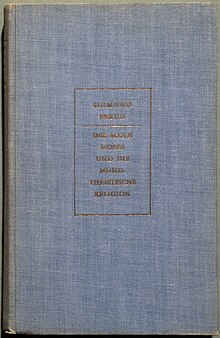Moses and Monotheism: Difference between revisions
Mlang.Finn (talk | contribs) →Further reading: add de Certeau |
→Reception and significance: revert section per talkpage discussion Tag: section blanking |
||
| Line 30: | Line 30: | ||
In ''Moses and Monotheism'', Freud contradicts the [[Bible|Biblical]] story of Moses with his own retelling of events claiming that Moses only led his close followers into freedom during an unstable period in Egyptian history after Akhenaten (ca. 1350 BC) and that they subsequently killed Moses in rebellion and later combined with another monotheistic tribe in [[Midian]] based on a volcanic God, Jahweh. Freud explains that years after the murder of Moses, the rebels regretted their action thus forming the concept of the Messiah as a hope for the return of Moses as the [[Salvation|Saviour]] of the [[Israelites]]. Freud said that the [[guilt (emotion)|guilt]] from the murder of Moses is inherited through the generations; this guilt then drives the [[Jew]]s to [[religion]] to make them feel better. |
In ''Moses and Monotheism'', Freud contradicts the [[Bible|Biblical]] story of Moses with his own retelling of events claiming that Moses only led his close followers into freedom during an unstable period in Egyptian history after Akhenaten (ca. 1350 BC) and that they subsequently killed Moses in rebellion and later combined with another monotheistic tribe in [[Midian]] based on a volcanic God, Jahweh. Freud explains that years after the murder of Moses, the rebels regretted their action thus forming the concept of the Messiah as a hope for the return of Moses as the [[Salvation|Saviour]] of the [[Israelites]]. Freud said that the [[guilt (emotion)|guilt]] from the murder of Moses is inherited through the generations; this guilt then drives the [[Jew]]s to [[religion]] to make them feel better. |
||
==Reception and significance== |
|||
Although they had a following at the time, Freud's interpretations are considered "fantasy" by modern scholarship.<ref>[http://books.google.fr/books?id=Y2KGVuym5OUC&pg=PA235 ''The Oxford Bible Companion''. William W. Meissner article ''Freud and the Bible''.]</ref> |
|||
==See also== |
==See also== |
||
Revision as of 02:36, 8 September 2014
This article includes a list of general references, but it lacks sufficient corresponding inline citations. (July 2013) |
 Der Mann Moses und die monotheistische Religion, first edition, 1939 | |
| Author | Sigmund Freud |
|---|---|
| Original title | Der Mann Moses und die monotheistische Religion |
| Translator | Katerine Jones |
| Language | German |
| Subject | Moses |
| Genre | Psychoanalysis Cultural studies Religious studies |
| Publisher | Knopf |
Publication date | 1939 |
Published in English | 1939 |
| Pages | 186 |
Moses and Monotheism (German: Der Mann Moses und die monotheistische Religion) is a 1939 book by Sigmund Freud, published in English translation in 1939.
Argument
In it Freud hypothesizes that Moses was not Hebrew, but actually born into Ancient Egyptian nobility and was probably a follower of Akhenaten, an ancient Egyptian monotheist. The book consists of three essays and is an extension of Freud’s work on psychoanalytic theory as a means of generating hypotheses about historical events. Freud had similarly employed psychoanalytic theory to history in his much earlier work, Totem and Taboo. As well as in his ever-expanding library on the subject, Freud's interest in Egypt manifested itself in an impressive collection of ancient Egyptian artefacts. A selection of the smaller bronzes was permanently on display on his desk both in Vienna and London.
In Moses and Monotheism, Freud contradicts the Biblical story of Moses with his own retelling of events claiming that Moses only led his close followers into freedom during an unstable period in Egyptian history after Akhenaten (ca. 1350 BC) and that they subsequently killed Moses in rebellion and later combined with another monotheistic tribe in Midian based on a volcanic God, Jahweh. Freud explains that years after the murder of Moses, the rebels regretted their action thus forming the concept of the Messiah as a hope for the return of Moses as the Saviour of the Israelites. Freud said that the guilt from the murder of Moses is inherited through the generations; this guilt then drives the Jews to religion to make them feel better.
See also
Further reading
- Assmann, Jan (1998). Moses the Egyptian: The Memory of Egypt in Western Monotheism Harvard University Press.
- Certeau, Michel de (1988). The Fiction of History: The Writing of Moses and Monotheism. [1975.] The Writing of History, pp. 308–354. (Translated by Tom Conley.) Columbia University Press, New York. ISBN 0-231-05574-9
- Chaney, Edward (2006). 'Egypt in England and America: The Cultural Memorials of Religion, Royalty and Religion', Sites of Exchange: European Crossroads and Faultlines, eds. M. Ascari and A. Corrado. Amsterdam and New York: Rodopi.
- Chaney, E, 'Freudian Egypt', The London Magazine (April/May 2006), pp. 62–69.
- Chaney, E, 'Moses and Monotheism, by Sigmund Freud’, 'The Canon', THE (Times Higher Education), 3–9 June 2010, No. 1,950, p. 53.
- Edmundson, Mark (2008). The Death of Sigmund Freud: The Legacy of His Last Days Bloomsbury United States ISBN 978-1-59691-430-8
- Paul, Robert A. (1996). Moses and civilization: The meaning behind Freud’s myth. ISBN 0-300-06428-4
- Rice, Emanuel (1990). Freud and Moses: The Long Journey Home. Albany, New York: State University of New York.
- Rice, Emanuel (1999). Freud, Moses, and the Religions of Egyptian Antiquity: A Journey Through History Psychoanalytic Review, 1999 Apr; 86(2):223–243. PMID 10461667
- Yerushalmi, Y. H. (1991). Freud's Moses. New Haven: Yale University Press.
References
External links
- Moses and Monotheism text at archive.org
